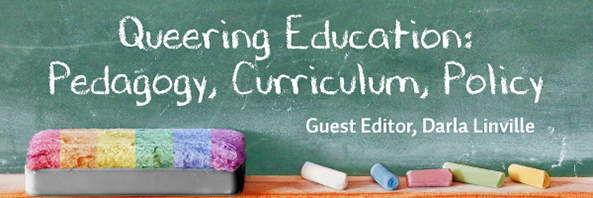The new Bank Street Occasional Paper Series #37—Queering Education: Pedagogy, Curriculum, Policy—launched today to provide educators with a closer look at issues surrounding lesbian, gay, bisexual, transgender, queer and questioning (LGBTQ) lives in educational settings.

This issue builds from the idea that while much progress has been made over the last few decades, the greater inclusion and engagement of LGBTQ identities in schools is dependent on work still to come. Through eight powerful essays, this series seeks to refresh, reinvigorate, and refocus the conversation around queerness in education and points the way to a more equitable and inclusive future.
Occasional Paper Series #37 guest editor Darla Linville, Assistant Professor of Educational Foundations at Augusta University, offers additional insight and perspective on the topic of queer theory in education and what she hopes readers will take away from this issue of the Occasional Paper Series.
Q: The theme of Occasional Paper Series #37 was conceived in the summer of 2015 after the Supreme Court ruled same-sex marriages must be recognized at the federal level. Now fast forward to today’s current political landscape and the administration’s campaign to strip away the rights of transgender students. Do you think this change in our nations’ atmosphere will impact the reader’s experience and, if so, how?
Q: At its core, queer theory strips away traditional norms and demands that students be seen as individuals with complex identities. This approach allows us to create meaningful relationships with one another and helps create a more inclusive space for LGBTQ students to develop and learn. Does this approach impact broader school communities as well? What, if any, benefits does this approach offer for all students and educators—queer and non-queer alike?
A: I would say that queer theory does ask us to look for unanticipated connections and directions and to avoid the usual pathways. In schools in particular, it would encourage us to de-track students, mixing them more in various kinds of classes—those considered academic and those considered vocational—and allowing students to follow their own interests and move from “track” to “track.” It might also suggest that we refuse binary categories such as academic and vocational and view all learning as valuable learning. If we follow this line of thinking, students could specialize themselves and also explore connections among ideas, interests, and disciplines. In similar ways to those mentioned previously, where we would give up organizing students using gender as a sorting property, queer theory would encourage us to not sort students according to a single set of abilities, such as literacy and math skills, and would allow for rearranging and reshuffling of groups throughout the years of schooling. Queering schools might create a place for students to be more fluid in all of their identities.
Q: What do you hope the reader takes away from Queering Education: Pedagogy, Curriculum, Policy?
A: Inspiration, challenge, joy—I want readers to feel astounded by the resources presented in these essays, the absolute multitude of ideas that can encourage them to make small changes in their own classrooms. There are many students looking for a place in school to express their gender or speak about their sexuality as a way of being completely present with all of their complexity in the most important social space in their lives. I hope readers read these essays and think, “I can do that.”
Read full issue: https://www.bankstreet.edu/occasional-paper-series/37/